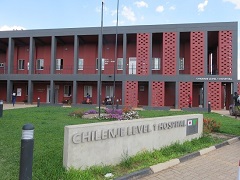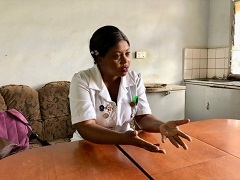- Home
- Technical Cooperation Projects
- Index of Countries
- Africa
- Zambia
- The Project for strengthening Basic Health Care Services Management for Universal Health Coverage (BHC for UHC Project)
- Project News
- DSAP approach 3: Strengthening the MCH referral system in Lusaka
Project News
2019-07-18
DSAP approach 3: Strengthening the MCH referral system in Lusaka
In many developing countries, many newborns are still losing precious lives. Zambia also has a high neonatal mortality rate, with 13,545 deaths out of 645,000 born in 2015. In other words, 21 people die for 1,000 newborns.[1] The main causes of neonatal deaths are asphyxia at birth, premature delivery, and neonatal sepsis/infections. The difference in the situation is clear, considering that 1 out of 1,000 newborns is dying in Japan. In Zambia, delivery is done at health centres or primary level hospitals. If problems occur with the mother or baby, they will be referred to the secondary or tertiary hospitals. Before setting the standardised criteria, about 80% of cases that needed to be handled at lower level facilities were referred to tertiary hospitals during the labour period.
This project has assisted in establishing a maternal and neonatal referral system. For example, when an abnormality in the mother or baby is found, or sudden change such as bleeding occurs during childbirth, it needs to be judged whether the mother or baby should be referred to an appropriate level hospital on a timely basis. The Project developed a guideline that describes the referral procedure and judgment criteria. However, it was challenging to implement it even if the guideline was made. In the area of neonatal care in particular, with resource constraints for proper training, a majority of health staff did not have adequate knowledge and skills on neonatal care. Therefore, the project supported the training of neonatal care in October 2018 after developing the MCH referral guideline.
The project supported Lusaka District Health Office to provide 4-day training on neonatal care, specifically neonatal cardiopulmonary resuscitation, Continuous Positive Airway Pressure (CPAP), and Kangaroo Mother Care, targeting health facilities in the District. The training was given by the neonatal resuscitation team that consisted of medical doctors, nurses and midwives from the University Teaching Hospital in Zambia. Nurses and midwives from 13 health facilities in Lusaka District have completed the training to date.
Ms Kooma Kalonga works as a nurse at the Chilenje Level 1 Hospital. She feels worthwhile to work as a nurse. She says, "By participating in the neonatal care training, I was able to become a nurse in charge of caring a baby right at the time of the delivery. I do an assessment of any abnormality and take appropriate measures if necessary." When asked if she has something memorable, she talked about picking up a baby born by cesarean section. "At that time, I entered the operating theater with a midwife. The midwife picked up the baby and I confirmed the condition of the newborn, but the baby did not made a cry." She continued, "I quickly sent oxygen to the baby's lungs and urged them to start breathing. I was relieved when the baby started to cry!"
Ms Kangkia Mbekie, who works at the Mutendele Health Centre, has just become a midwife. The health centre has about 2,000 births a year, of which about 300 babies are referred to the nearby hospital. She says, "I only have another midwife and a trainee doctor in the current shift. Because of a shortage of staff, we need an adequate skill set to deal with as many deliveries as possible." In many health centres, a number of cases are referred to a higher-level hospital due to lack of skills. The number of referrals has been on the decrease in this health centre. According to the Project study for 10 months, the results show that the compliance rate with the MCH referral guideline improved from 20% to 29% in Lusaka District. She continues, "The midwife decides whether or not to refer a severe case at birth here. Given the need to make the right judgment, strengthening technical skills will continue to be important."
 Chilenje Level 1 Hospital, Lusaka
Chilenje Level 1 Hospital, Lusaka
 Ms Kooma Kalonga, Nurse
Ms Kooma Kalonga, Nurse
 Ms Kangkia Mbekie, Midwife
Ms Kangkia Mbekie, Midwife
Note
- [1] Maternal and Newborn Health Disparities Zambia, 2018
- About JICA
- News & Features
- Countries & Regions
- Our Work
- Thematic Issues
- Types of Assistance
- Partnerships with Other Development Partners
- Climate Change / Environmental and Social Considerations
- Evaluations
- Compliance and Anti-corruption
- Science and Technology Cooperation on Global Issues
- Research
- JICA Development Studies Program / JICA Chair
- Support for the Acceptance of Foreign HRs / Multicultural and Inclusive Community
- Publications
- Investor Relations
